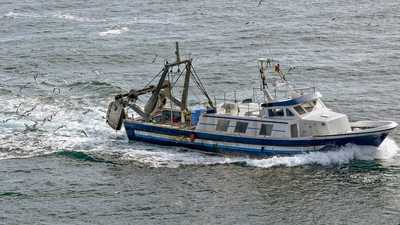| Home | About | Archives | RSS Feed |

The Retired Investor: Empty Oceans
 |
Oceans cover more than two-thirds of the earth's surface. For centuries, these bodies of water have supplied us with a bountiful harvest of ocean wildlife and millions of well-paying jobs. Unless something changes, however, the future of fisheries is in serious jeopardy.
The demand for fish is growing with aquaculture trends reaching a growth rate of 527 percent from 1990 to today. At the same time, fish consumption has doubled as well.
Declining fisheries, the destruction of the marine habitat, and the near-depression-like economic conditions of more and more coastal fishing communities, is no surprise to most of us. It has been going on for decades. And yet, the appetite for fish, especially among developing nations, keeps growing by more than 3 percent a year. Fish consumption accounts for one-sixth of the global population's intake of animal protein, and more than half in many emerging markets has doubled as well.
Since the 1980s, the global seafood catch has been falling. This is despite better fishing boats and improved underwater technology, such as GPS, fish finders, echo-sounders, and acoustic cameras. This has led to an annual 2 percent-per-year increase in a boat's capacity to capture fish. Thanks to this "technological creep," the 10-boat fishing fleet of a generation ago has the power of 20 vessels today.
At least a billion people, if not more, rely on fish as their primary protein source and tens of millions of people around the world depend on the sea for their livelihood. As such, several foreign governments have traditionally provided massive subsidies ($35-40 billion a year) to their fishing fleets in order to increase their ability to compete and catch more of the world's fish. The top five nations include China, the European Union, the U.S., Korea and Japan.
Global fishing fleets are taking too much wildlife from the sea and the laws and regulations that are meant to manage and conserve fisheries are either ignored or only selectively enforced. The fact that wild-capture fish prices continue to increase and are projected to rise by 23 percent over this decade makes flouting the law an easy excuse. There is not a day that goes by without some new violation of existing fishing regulations somewhere, and those illegal activities are increasing.
We all know this, but few realize how bad the problem has become. Most scientists expect that if the present situation continues, by 2050 there will be a complete collapse of all wild seafood that is fished today. Ninety percent of all tuna, marlin and sharks will be gone. Of the top 10 species that account for 30 percent of all fisheries production, six of them (anchoveta, mackerel, pollock, Japanese anchovy, blue whiting and Atlantic herring) are fully exploited or overexploited today.
The World Trade Organization (WTO) is where government leaders meet to negotiate the dos and don'ts of commercial fishing. Six years ago, negotiations began on eliminating government subsidies that are behind the excessive and illegal depletion of the world's fisheries. It has been a game of good intentions, but broken promises. Deadlines come and go, but like so many things at the WTO, nothing has changed.
China, India, and other Asian nations account for 85 percent of the world's commercial fishing employment. Those governments have only been interested in gaining exemptions, rather than enforcing more discipline among their fishing fleets. But there may be hope yet.
For one thing, there is a new director-general at the WTO, Ngozi Okonjo-Iweala. She has moved a successful fishery deal to the top of her agenda for 2021. She is pushing member trade minsters to agree and sign a deal by July.
At the same time, President Biden has placed environmental concerns at the top of his agenda. His U.S. Trade Representative Katherine Tai seems focused on the problem of overfishing and is backing the WTO's efforts to finally get members to take some actions. Let's hope, for all our sakes, that the world can finally come to its senses before our oceans end up depleted.
Bill Schmick is the founding partner of Onota Partners, Inc., in the Berkshires. His forecasts and opinions are purely his own and do not necessarily represent the views of Onota Partners Inc. (OPI). None of his commentary is or should be considered investment advice. Direct your inquiries to Bill at 1-413-347-2401 or email him at bill@schmicksretiredinvestor.com.

